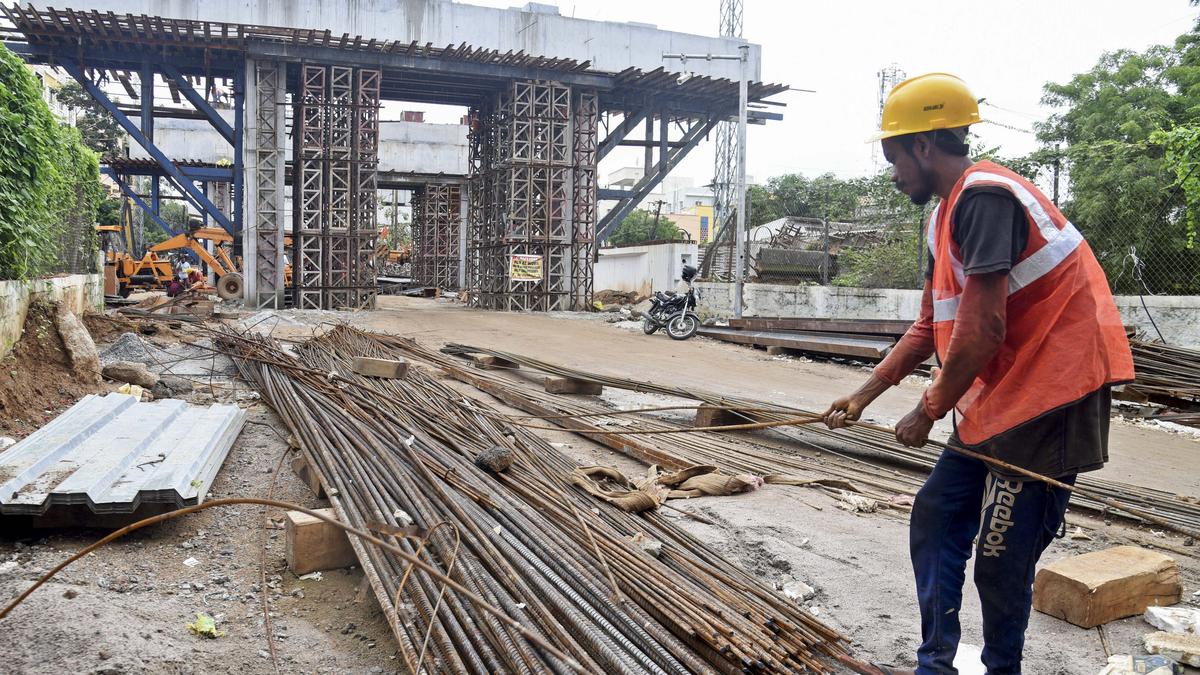During the mornings, the labour addas (informal job markets where labourers hope to get hired for a day) of Hyderabad are filled with young men. Speaking in Bengali, Odiya, Hindi, and other languages, they hope to get hired by supervisors of construction sites.
Babul Shaik, a mason, arrived five years ago from a village in Malda district of West Bengal. “I had to look for work because I have no land, and no property except a small house that my father built,” he says. “I live in a room with four others from my village. In the morning, I walk to the Zehra Nagar labour adda, which is near our room. I mostly do plastering work and make ₹1,000-1,200 a day.”
At an under-construction site, Laxmi, 30, from Chhatisgarh, works as a helper. “I work from 8 a.m. to 5 p.m. or even 7 p.m. I carry material [cement and sand amalgamate] into bathrooms, and throw debris out. I get paid ₹500-600 a day,” she says.
At larger construction sites, a contractor is entrusted to source migrant labourers. “Most of the larger projects are in West Hyderabad, in and around the IT Corridor. It is better to work here than live under tarpaulin sheets at smaller sites,” says a property consultant who deals with large construction firms.
Informal sector workers’ rights bodies such as India Labour Line have identified 220 labour addas spread across the Greater Hyderabad Municipal Corporation limits. These are frequented by migrants from Bihar, Uttar Pradesh, West Bengal, Odisha, and Jharkhand. About 100 to 1,200 workers go to these addas looking for work every day.
While there is no conclusive data on migrant workers in Telangana, the number was estimated to be around 8 lakh-10 lakh before the pandemic. More than 44 lakh informal sector workers are registered on the eShram portal in Telangana. In the construction sector, an official data set for Hyderabad district shows that 22,934 male and 4,457 female workers are registered. The Telangana Building and Other Construction Workers Welfare Board (TBOCWB), a state-run body that looks into the well being of workers, says the number of workers is 15,06,171.
“The problem is that a vast majority of the workers, including construction workers, are not registered,” says Brother Varghese Theckanath, director of the Monfort Social Institute. The lack of registration means that these workers do not get access to welfare schemes. This includes compensation for accidental deaths, suffering disability while working at construction sites, and natural deaths.
TBOCWB Secretary and Chief Executive Officer E. Gangadhar says in the last 10 years, the Board has paid accidental death claims of ₹6 lakh each to 5,231 individuals, who are the relatives of the workers who died; ₹1 lakh each to 48,266 individuals, the relatives of workers who died of natural causes; ₹5 lakh to each of the 603 individuals who sustained disabilities; and also registered 3,959 cases of hospitalisation.
However, the issue of tracking migrant workers remains. “The over 15 lakh who have been registered are mostly construction workers from Telangana (and not from other States),” Gangadhar says. He adds that the Labour Department has conducted campaigns in the past to educate workers about the importance of registering with the Board.
It is important to note that the TBOCWB is supposed to comprise two members representing building workers and two others representing employers. However, at present, the first two posts are vacant.
In 2022, the Bharat Rashtra Samithi had announced that 95% jobs in government departments, agencies, and corporations would be reserved for locals. This move was not extended to the private sector.
Sources say a large share of migrant workers are unaware of both the eShram portal and TBOCWB. Also, the registration process could prove difficult. “They have to apply for registration at the MeeSeva (a centre where a host of government services are available). For this they have to take a day off, as they cannot leave the site midway. This means losing out on daily wages,” says an expert who studies informal sector workers.
Both Shaik and Laxmi are unaware of schemes for construction workers.
“Workers don’t know what schemes are available for them,” says U. Lingaiah, State Coordinator, India Labourline, which works with workers of the informal sector. “In July last year, there were two accidental deaths of construction workers — one from U.P. and the other from Odisha — in Mamidipally (on the outskirts of Hyderabad). We managed to get ₹5 lakh each for their families from building owners. These were not registered workers,” he says.

